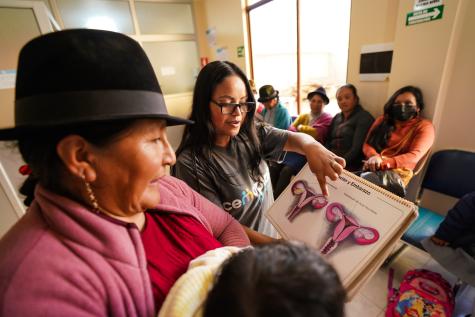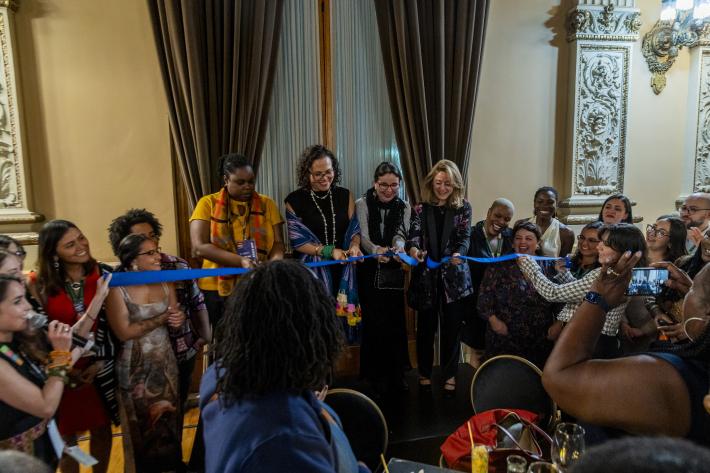
Spotlight
A selection of news from across the Federation

Americas & the Caribbean
Our Statement on the Reinstatement of the Global Gag Rule
The Global Gag Rule (GGR) violates our core principles, and IPPF cannot and will never sign it.
Filter our news by:


| 17 July 2024
May News Round-Up
Haz click aquí para leer el Resumen de noticias de mayo en español. Brazil | Gestos celebrates 31 years of advocating for SRHR Gestos, IPPF Collaborative Partner in Brazil, celebrated their 31st anniversary with dance, music and much love from their community. Since their founding, they have advocated to link social, cultural, economic and environmental issues to inclusive and effective public policies on sexual and reproductive health and rights. For 31 years, Gestos has effectively contributed to guaranteeing the human rights of people living with HIV and AIDS. Around 70 per cent of the people who have sought legal support from the institution have had their rights repaired, through injunctions and judgements. Gestos' advocacy efforts effectively reach multilateral bodies dedicated to monitoring HIV, gender, sexual rights and public development policies and, since 2001, the organisation has been monitoring United Nations resolutions on these agendas. Congratulations, parceiras! Bolivia | Colectivo Rebeldía celebrates diverse 🏳️🌈 🏳️⚧️ families for IDAHOBIT To commemorate the International Day Against LGBTIphobia, Colectivo Rebeldía, Collaborative Partner in Bolivia, joined the Sexual Diversity Movement of Santa Cruz to celebrate love and diversity on May 17th. They brought the community together to celebrate all forms of love and all forms of families. The cold weather was no obstacle to this warm and welcoming gathering where they shared moments of reflection, art and connection. You can learn more about this joint project with their most recent (and creative!) post. Cuba | Cenesex fights LGBTQI-Phobia with gala, march and community-oriented events IPPF Collaborative Partner in Cuba, Cenesex, went all out for IDAHOBIT celebrations with the Cuban Days Against Homophobia and Transphobia during the month of May. They took the streets to the rhythm of the Cuban Conga against Homophobia and Transphobia, waving the trans and transinclusive pride flag across San José de las Lajas. They also celebrated the graduation of 30 transgender people as Sexual Health and Rights promoters in prisons. Their community work is incredible! Dominica | Dominica Planned Parenthood Association champions gender equality at SIDS4 From May 27-30 the Dominican Planned Parenthood Association participated in the 4th International Conference on Small Island Developing States. This year, Antigua & Barbuda was host to leaders from the 39 independent States and 18 Associate Members of United Nations regional commissions and other world leaders, officials, and experts from the private sector, academia and civil society. DPPA participated in the Gender Equality Forum as part of the SIDS4, bringing forward the importance of addressing gender-based violence. Haïti | The Association of Midwifes of Haiti highlights the important role of midwives at the forefront of crisis. To celebrate the International Day of the Midwife, on May 6th the Association des Sages-Femmes d’Haïti (ASFH) organized the webinar “Midwives in Haïti: Agents of Solution in the Socio-political Crisis”, of particular importance in the country’s current context. Key stakeholders came together to discuss best practices, challenges and solutions to strengthen maternal and child health in the country. It was a relevant virtual platform for reflection, exchange of ideas and collective action. Perú | INPPARES and IPPF ACRO express concern regarding the latest Health Ministry’s decree that violates LGBTQI+ rights. The IPPF Americas and Caribbean Regional Office joined INPPARES, IPPF Member Association in Peru, in expressing its rejection of the Supreme Decree Nº 009-2024-SA issued on May 10th by the Peruvian Ministry of Health which, by updating the Essential Health Insurance Plan (PEAS) based on the 10th revision of the International Classification of Diseases (ICD-10), violates the human rights of LGBTIQ+ people. This decision of the Peruvian government to use ICD-10 is very serious, as it violates binding codes and agreements at local, regional and international level. You can read our joint statement here. If you want to receive SRHR news directly from the ground to your inbox, subscribe to our newsletter Rising the Tide: Subscribe

| 07 June 2022
CSE: the pending task in Peruvian schools for INPPARES
Blog by Irma Ramos Executive Director of INPPARES featured in El Comercio Comprehensive Sexuality Education (CSE) plays an essential role in the health and well-being of all people. Having CSE in schools will provide children and adolescents with an education based on the promotion, protection and exercise of their human rights. Despite the efforts and implementation of strategies by various state agencies, there is no significant decrease in adolescent pregnancy. During the two years of confinement, we have presented cases of sexual violence and forced unions, especially in adolescents who required counselling on their sexual and reproductive health. In 2020 alone, the most critical year of the pandemic in Peru, 1,158 adolescents under the age of 15 became mothers, according to INEI. The Demographic and Family Health Survey (Endes, 2021) reveals that, of the 8.9 per cent of pregnancies registered in women aged 15-19, only 33.6 per cent completed primary school. The same source indicates that 6.9 per cent of women aged 15-49 have suffered physical violence by their husband or partner in the last 12 months and, of this figure, 1.8 per cent admit to having been sexually abused by their partner. Furthermore, in 2021, 146 femicides and 123 attempted femicides were perpetrated, according to the Ombudsman's Office. This is why, if we empower women from a young age with education, support and access to services so that they can exercise their sexual and reproductive rights, we will advance in the construction of gender equality with a rights-based approach. The Comprehensive Sex Education Guidelines for Regular Basic Education (RVM-169-2021-MINEDU) were approved almost a year ago. From Inppares, we have promoted the first network of CSE advocate teachers at national level, in order to contribute through them to the empowerment of students, collaborating in their self-knowledge, self-care, relationships and sexuality; helping them to cope in a world where violence, gender-based inequalities, unplanned teenage pregnancies, HIV and other sexually transmitted infections (STIs) continue to pose serious risks to their health and wellbeing. As civil society, we regret that children and adolescents continue to be recurrent victims of various forms of violence. The experiences they go through are harrowing and in most cases are faced alone. It affects them physically, psychologically and socially and, for the most part, prevents them from fulfilling their dreams and life projects. With regard to the legal framework, we are lagging behind in comparison with other countries in the region. In Latin America, six countries have laws that promote Comprehensive Sexuality Education (Mexico, Colombia, Argentina, Ecuador, Nicaragua and Uruguay). Meanwhile, in our country, achieving a norm with the status of law seems to be getting further and further away with initiatives such as the recent bill 904-2021-CR, which seeks to allow certain groups of parents' associations to supervise educational texts and materials without having the technical and pedagogical requirements to carry out such an important task. It is due to this ungrateful reality that we advocate for gender equality, healthy relationships, healthy sexual behaviour and the prevention of sexually transmitted infections from a positive, scientific, educational perspective, promoting a culture of prevention and emphasising values such as respect, inclusion, non-discrimination, equality, empathy, responsibility and reciprocity. From civil society, we advocate politically and publicly in favour of CSE, through alliances and constant dialogue with stakeholders, authorities, organisations, journalists, teachers and adolescents and young people, with the aim of influencing public policies, promoting the sexual and reproductive well-being of people living in Peru, as well as the free exercise of their rights. Irma Ramos Executive Director of Inppares
















